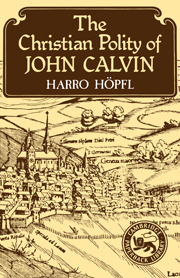Book contents
- Frontmatter
- Contents
- Preface
- Note on sources, orthography, notes and translations
- Introduction
- 1 The training of a lawgiver
- 2 The Institution: the first version
- 3 The first public ministry
- 4 Reconstruction
- 5 The Institution of 1543
- 6 Geneva and Calvin, 1541–64
- 7 The civil order of a Christian commonwealth
- 8 Political morality in the thought of Calvin
- 9 The laws and mores of a Christian commonwealth
- 10 Unfinished business: a speculative summary and postscript
- Appendix I Calvin's conversion
- Appendix II Predestination
- Notes
- Bibliography
- Index
- Cambridge Studies in the History and Theory of Politics
1 - The training of a lawgiver
Published online by Cambridge University Press: 24 October 2009
- Frontmatter
- Contents
- Preface
- Note on sources, orthography, notes and translations
- Introduction
- 1 The training of a lawgiver
- 2 The Institution: the first version
- 3 The first public ministry
- 4 Reconstruction
- 5 The Institution of 1543
- 6 Geneva and Calvin, 1541–64
- 7 The civil order of a Christian commonwealth
- 8 Political morality in the thought of Calvin
- 9 The laws and mores of a Christian commonwealth
- 10 Unfinished business: a speculative summary and postscript
- Appendix I Calvin's conversion
- Appendix II Predestination
- Notes
- Bibliography
- Index
- Cambridge Studies in the History and Theory of Politics
Summary
In April 1532, there issued from a Parisian printer a volume entitled Two Books Concerning Clemency, Written by the Distinguished Roman Senator and Philosopher L. Annaeus Seneca for the Emperor Nero, Elucidated by the Commentaries of Jean Calvin of Noyon. The volume, which was in Latin and therefore intended solely for the erudite, aroused no interest at the time, and would be of consequence now only to the specialist in humanist Latinity, but for its authorship. The temptation to treat it as the little acorn which contains in nuce the mighty oak of the Reformer's later work is to be resisted. It is explored here simply for what light it may shed on the education and political sentiments of a man who, without having any inkling of it then, was to become the teacher of ecclesiastical polity to generations of evangelicals.
In 1532 Calvin was twenty-three years old. He is thought to have begun the work when he was little more than twenty, prior to his graduation as licencié ès lois from the University of Orleans (in early 1531). He had long been Master of Arts, proceeding to that degree at the University of Paris in 1525 or 1526.
- Type
- Chapter
- Information
- The Christian Polity of John Calvin , pp. 5 - 18Publisher: Cambridge University PressPrint publication year: 1982

